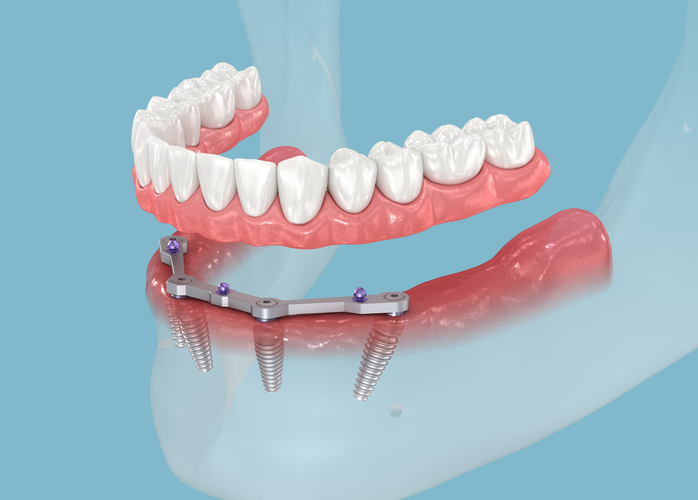Full or partial dentures can provide a significant boost to the quality of life of people who are missing several or all their teeth. Dentures can improve the person’s ability to speak and allow them to enjoy a wider variety of foods. However, traditional dentures are notorious for being uncomfortable. Thus, many patients ask: can you wear dentures over dental implants? In this article, we discuss implant-supported dentures.
Can You Wear Dentures Over Your Dental Implants?
There are types of dentures that can be worn over dental implants because the implants are specifically used to support the dentures. These types include snap-on dentures and implant-supported dentures, which are also referred to as all-on-four.
What Are Implant-Supported Dentures?
This type of denture is also called all-on-four, meaning that they need four dental implants to rest on. Such dentures are not removable, and they are permanently affixed in the mouth and function similarly to your natural teeth. All-on-four dentures provide comfort and security when chewing food and speaking and eliminate the risk of the dentures snapping off, sliding in the mouth, or falling out.
All-on-four dentures also provide up to 90 percent of your natural bite force, which means that you can enjoy a wide variety of foods, including hard foods that you can not eat with traditional dentures. Another advantage of this type of dentures is that they do not cover the pallet of the mouth, allowing you to feel the taste of the food.
Taking care of all-on-four dentures is similar to taking care of your natural teeth. The only difference is that you will need to use special flossing techniques to effectively clean under your denture.
What Are Snap-on Dentures?
Snap-on dentures are removable, similar to traditional dentures. Nonetheless, snap-on dentures are stable in the mouth because they are securely attached to dental implants. Typically, such dentures literally snap on several implant abutments. Such dentures also eliminate the discomfort of slipping or shifting in the mouth, providing much more comfort and security when eating and speaking than traditional dentures.
Caring for snap-on dentures is essentially the same as caring for traditional dentures. They should both be removed for cleaning at night and soaked in a denture cleansing solution.
Implant-supported Dentures Versus Traditional Dentures
The main differences between dentures that are affixed to implants and those that rest on the gumline and the palette in the mouth are the comfort and security felt when wearing them. Often, traditional dentures shit in the mouth, causing pain and irritation. They can also slip when you are chewing your food, causing significant discomfort. Additionally, traditional dentures provide only about 20 percent of natural bite force, significantly limiting the patient’s diet. All these issues can be solved with implant-supported or snap-on dentures.
Why Do I Need to Wear Traditional Dentures After Implant Surgery?
Once you get your implants placed in preparation for wearing snap-on or implant-supported dentures, your dentist will most likely tell you that you will still have to wear traditional dentures for several months. The reason for this is that your implants have to heal and completely fuse with the bone before they can securely support snap-in dentures.
If you start wearing snap-on or implant-supported dentures right away while the implants are healing, the risk of implants failing is very high. Constantly taking off the snap-on dentures for cleaning and then putting them back in the mouth will put unnecessary strain on the implants, preventing them from healing properly.
What Is the Implant Placement Procedure?
To prepare for snap-on or all-on-four dentures, you will first have to get dental implants placed in your mouth. It is a surgical procedure during which metal posts are put directly into the jaw bone. Later, the posts will fuse with the bone and act similarly to the roots of natural teeth. The healing process can take several months.
Some patients are unable to get dental implants due to issues such as insufficient jaw bone density or gum disease. In these cases, these problems need to be solved first. One of the most common and effective procedures for patients with bone density loss is bone grafting. Bone and gum grafting can also be effective when treating gum disease. During the procedure, grafts are surgically placed under the gum line to prompt tissue regeneration and prepare it for implants.
Make an Appointment Today
If you need reliable and comfortable dentures, do not hesitate to make an appointment with a dentist in Beverly Hills today. TruGlo Modern Dental works with high-quality materials and employs up-to-date medical techniques to ensure the effectiveness of our dental solutions. We look forward to your visit to our dental office.
